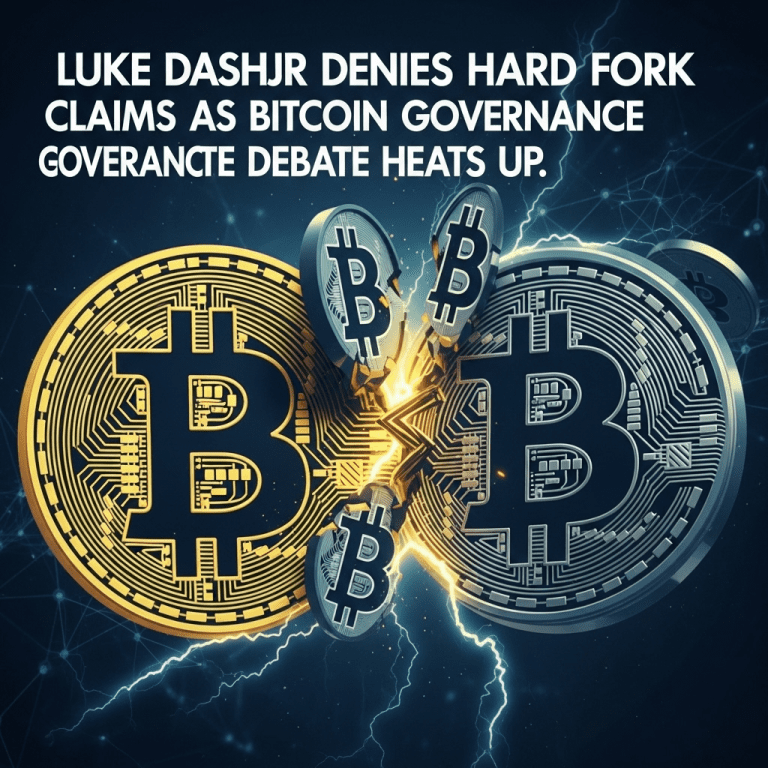The spotlight has turned to long-time Bitcoin Core developer Luke Dashjr, as he publicly addressed rumors surrounding a potential split in the Bitcoin network. In recent weeks, “Luke Dashjr Denies Hard Fork Claims as Bitcoin Governance Debate Heats Up”—a phrase echoing across crypto forums and social media. As questions about Bitcoin’s future direction mount, understanding the truth behind these claims is critical for investors, miners, and crypto watchers navigating 2025’s evolution of digital asset governance.
Bitcoin Governance: Why the Debate Is Heating Up in 2025
Bitcoin operates on a decentralized ethos, but its open-source code and protocol changes are governed by a complex, consensus-driven process among developers, miners, and node operators. Throughout 2025, ongoing debates about scalability, security enhancements, and proposed Bitcoin Improvement Proposals (BIPs) have sharpened questions about who truly steers the network. This rising tension has fueled speculation and misinterpretation—including recent hard fork rumors now firmly denied by Dashjr.
Origins of the Hard Fork Rumors
The controversy began after an open discussion on crypto developer channels where Dashjr, known for his conservative stance on Bitcoin protocol stability, voiced concerns about certain upcoming code changes. Observers took his cautionary notes out of context, sparking speculation of an impending network split or “hard fork” led by Dashjr and others. This narrative quickly gained traction, amplified on crypto Twitter and mainstream crypto media.
Luke Dashjr Denies Hard Fork Claims as Bitcoin Governance Debate Heats Up: The Developer’s Official Stance
Luke Dashjr set the record straight in a detailed post on leading community forums, noting that although he supports rigorous debate around protocol changes, he is not advocating for—or planning—any hard fork of Bitcoin. “My commitment remains to Bitcoin’s core values and network integrity,” Dashjr wrote. By clarifying his stance, he aimed to quell fears of major disruption to the main chain and underscore his investment in collaborative process, not division.
What Is a Hard Fork and Why Do They Matter?
A hard fork is a radical change to a blockchain protocol that makes previously invalid blocks or transactions valid (or vice versa), requiring all nodes to upgrade to the new version. Notable forks, such as Bitcoin Cash in 2017, have historically split communities and created volatile market events. In the current climate, the denial from Dashjr is a reassurance to users and exchanges wary of potential downstream impacts.
Examining the Core of Bitcoin’s Governance Debate
As the 2025 landscape of cryptocurrencies matures, Bitcoin’s internal debates have profound effects—both technically and reputationally. Key issues include:
- Scalability: Ideas for increasing transaction throughput without compromising security.
- Decentralization: Safeguarding against concentration of influence, whether by developers or large miners.
- Security and Upgrades: Reviewing proposals for advanced cryptography and consensus adjustments.
Many developers urge slow, careful progress to preserve Bitcoin’s stability, while others advocate for faster, more adaptive innovation. Dashjr’s approach reflects the former—valuing security and predictability—making his denial of a hard fork all the more significant.
Implications for Investors and the Crypto Market
Whenever rumors of consensus splits or forks arise, volatility often follows. Assurance from respected developers like Dashjr not only reduces uncertainty but also strengthens trust in Bitcoin’s ongoing resilience against fragmentation. For stakeholders learning about governance risks, staying informed on factual statements—rather than speculation—is crucial. For more in-depth analysis on crypto trends and security, readers can refer to independent financial insights.
Community Perspectives and the Role of Open Dialogue
Healthy, transparent discourse is vital to decentralized governance. The recent episode underscores both the vibrancy and occasional pitfalls of open-source development, where casual conversation can sometimes be misinterpreted as direct intent. Community members are encouraged to seek information from trusted sources and review primary statements, rather than relying solely on social buzz. Guidance on responsible crypto information sourcing is available at educational crypto resources.
What’s Next for Bitcoin Governance in 2025?
Looking ahead, the pressure is on for the Bitcoin community to strike a balance between innovation and security. As debates continue, figures like Luke Dashjr will likely remain at the center—not as instigators of splits, but as stewards advocating for the long-term health of Bitcoin. Market participants would do well to observe official channels, review BIPs, and participate in governance with open eyes. Investors seeking expertise on crypto governance issues can explore analysis and expert commentary.
Conclusion: Staying Grounded Amidst Crypto Controversy
In summary, while headlines such as “Luke Dashjr Denies Hard Fork Claims as Bitcoin Governance Debate Heats Up” may spark concern, the facts reveal a different story. As long as core developers like Dashjr continue prioritizing consensus and transparency, the risks of unforeseen splits remain low. Ultimately, Bitcoin’s governance process—however contentious—remains one of the most transparent and community-driven in global finance. Astute observers and participants alike should focus on information, not rumors, as the network faces new challenges in 2025 and beyond.









